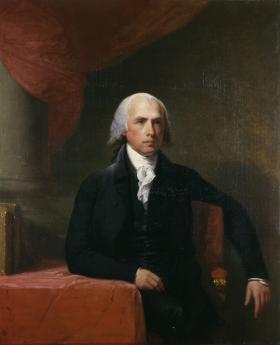Related Topics
Federalism Slowly Conquers the States
Thirteen sovereign colonies voluntarily combined their power for the common good. But for two hundred years, the new federal government kept taking more power for itself.
Unwritten Constitutional Modification
It is so difficult to amend the Constitution, we mostly don't do it. Our system is to have the Supreme Court migrate slowly through several small adjustments, watching the country respond. Occasionally we have imported new principles, sometimes not entirely wise ones, adopted without the same seasoning.
Unconstitutionality of Otherwise Desirable Laws
Note: James Madison, the central figure in the design and meaning of the Constitution, the only person allowed to keep a journal of the deliberations, and the main author of the Federalist Papers which explain and defend the final product, was eventually elected President of the United States. As such, he was acutely aware of the intention of the Constitution's limitation of federal powers, which particularly extended to prohibit the Federal Government from doing otherwise desirable things. On November 3, 2010, the Wall Street Journal republished part of Madison's veto message of March 17, 1817, in which he reminds the Congress and the nation that it was unconstitutional for the Congress to do prohibited things, thereby assuming unenumerated powers.

|
| President James Madison |
"The legislative powers vested in Congress are specified and enumerated in the eighth section of the first article of the Constitution, and it does not appear that the power proposed to be exercised by the bill is among the enumerated powers, or that it falls by any just interpretation within the power to make laws necessary and proper for carrying into execution those or other powers vested by the Constitution in Government of the United States."
"The power to regulate commerce among the several States" cannot include a power to construct roads and canals, and to improve the navigation of water courses in order to facilitate, promote, and secure such a commerce, without a latitude of construction departing from the ordinary import of terms strengthened by the known inconveniences which doubtless led to the grant of this remedial power to Congress."
To refer the power in question to be "to provide for the common defense and general welfare" would be contrary to the established and consistent rules of interpretation...It would have the effect of subjecting both the Constitution and laws of the several States in all cases not specifically exempted to be superseded by the law of Congress... Such a view of the Constitution, finally, would have the effect of excluding the United States from its participation in guarding the boundary between the legislative powers of the General and the State Governments..."
I am not unaware of the great importance of roads and canals and the improved navigation of water courses, and that a power in the National Legislature to provide for them might be exercised with signal advantage to the general prosperity. But seeing that such a power is not expressly given by the Constitution, and believing that it can not be deduced from any part of it without an inadmissible latitude of construction and reliance on insufficient precedents; believing also that the permanent success of the Constitution depends on a definite partition of powers between the General and the State Governments, and that no adequate landmarks would be left by the constructive extension of the power of Congress as proposed in the bill, I have no option but to withhold my signature from it.."
Postscript: This veto was the last act of Madison's term in office, and probably does not adequately describe the problem or even Madison's view of it. The Louisiana Purchase had dramatized some awkward features of strict construction of the Constitution in areas never before considered or discussed. Albert Gallatin had earlier arranged the workaround of treating the limitation as applying only to the financing of interstate transportation arrangements and was starting the process of what we now call the "Living Constitution" by progressive circumvention. While following Madison's reasoning, he made the unfortunate choice of circumvention in preference to confronting issues directly through the Amendment process. The Tea Party movement of 2010 could be evidence that this choice is regarded by many as unfortunate. The Constitution has probably not adequately appraised the tendency of legislation to achieve final passage quite near the congested end of an electoral term, leaving little time to respond to Congressional action with the intentionally cumbersome Constitutional Amendment process. If there is a turn-over of party control at that time (which is usually the holiday season), a successful outcome appears still more unlikely in the time available. Fixing such an inadvertent technical problem would not appear to be difficult, and a Blue Ribbon study committee is suggested.Originally published: Wednesday, November 03, 2010; most-recently modified: Monday, July 22, 2019